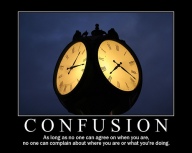Jul 26
20102
commentsIn Confusion, Connecting, Conversation, Frustration, Growth, Listening, Living Life Well, Pain, Personal Development, Relationships, Sabotage, Self Leadership, Willingness
Confusion: The Ultimate Saboteur of Conversation & Relationship
 The title says it all! I am finding myself perplexed by the degree of complexity that surrounds conversations and relationships. I ask myself, “How on earth did we get here and where do we go from this point on?”
The title says it all! I am finding myself perplexed by the degree of complexity that surrounds conversations and relationships. I ask myself, “How on earth did we get here and where do we go from this point on?”
If you have ever been in the position of helping a conversation move forward, you know exactly what I am talking about. Conversation gets bogged down, consequently the relationship gets stuck in this murky, unclear emotional soup that limits freedom of speech, freedom of sensing (other than anger and frustration), and ultimately, freedom ”to be” in relationship. I wish to propose that the greatest saboteur is confusion. So, what causes confusion and how does one name it, move out of it, and use it to gain momentum for improving conversation and relationship? Certainly, this could be a book, however, I wish to suggest a few thoughts.
Margaret Wheatley suggests that “Growth is in the roots of all things.” I![]() really appreciate that phrase. Growth truly is the genesis of all organic matter. When life endeavors to grow, it sends its tender roots down to absorb the life and nutrients that are available in the soil.
really appreciate that phrase. Growth truly is the genesis of all organic matter. When life endeavors to grow, it sends its tender roots down to absorb the life and nutrients that are available in the soil.
Conversation is similar. We send our tendrils out into t he void not knowing how the other person will respond, yet we hope that there will be something to gently “connect” to in relationship with the sense of “other” in the conversation. In an earlier post, I suggested that the quality of change in a person’s life must come out of their view of reality. I am certain that if we do not boost the importance of conversation we will continue to experience the consistent limitations of what we are currently experiencing. I believe that conversation is sabotaged by four primary qualities:
he void not knowing how the other person will respond, yet we hope that there will be something to gently “connect” to in relationship with the sense of “other” in the conversation. In an earlier post, I suggested that the quality of change in a person’s life must come out of their view of reality. I am certain that if we do not boost the importance of conversation we will continue to experience the consistent limitations of what we are currently experiencing. I believe that conversation is sabotaged by four primary qualities:
- Poor listening
- Closed attitudes and heart condition
- Fear of being wrong with a greater emphasis on being right
- Prior conversations that have already tainted reality and perceptions
 When we begin to notice the emotional stickiness of a conversation, be aware that something is happening. The flow is absorbed by added mental processing to overcome and guarantee refuge in the event that there is not receptivity or connection. Flight, fight, or freeze, typically is our dominant response.
When we begin to notice the emotional stickiness of a conversation, be aware that something is happening. The flow is absorbed by added mental processing to overcome and guarantee refuge in the event that there is not receptivity or connection. Flight, fight, or freeze, typically is our dominant response.
Improving the conversation will need the opposite of the already mentioned saboteurs. Improvement begins with a few pointers:
- Willingness to listen.
- Being open and curious not so much about what another has to say, rather what meaning is conveyed while conversation is taking place.
- Posturing oneself in a position of not knowing until learning from another has taken place.
- Possessing boldness to be honest.
Certainly this is my most lengthy blog. How do I say what needs to be said.? What do you have to say?
Photos Courtesy of Flickr, Tsmyther, Tina Manthorp, Siclif3




